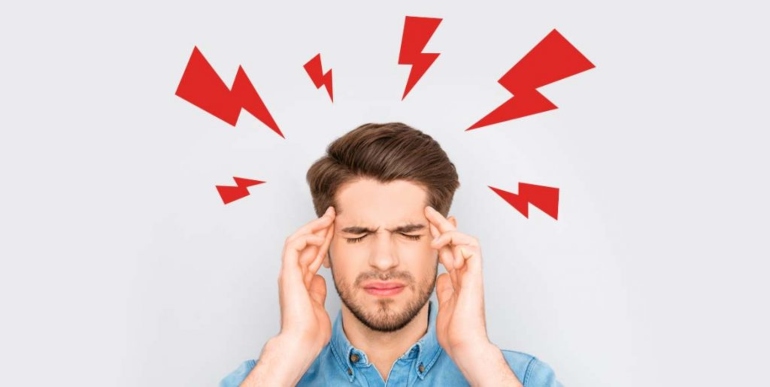Overview
Headaches occur due to a variety of reasons and affect almost everyone regardless of age, gender and race.
According to a study conducted by the Global Burden of Disease (GBD), headache disorders are one of the most common and disabling conditions around the world.
Women, compared to men, are 2 to 3 times more likely to experience headaches (particularly migraine).
In this article, we’ll talk about headaches in detail…
Causes of Headaches
Doctors categorise headaches based on whether or not they are caused by an underlying health condition.
Headaches that aren’t caused by an underlying health condition are called primary headaches, which appear to be caused by genetic and environmental factors. Cluster headaches, migraine headaches and tension headaches are the most common types of primary headaches, says the Mayo Clinic.
If a headache is caused by an underlying health condition, it is called a secondary headache. A neck injury, very high blood pressure or a sinus infection can be given as examples.
The most common causes of headaches are as follows:
- Not drinking enough fluid
- Skipping meals
- Pregnancy
- Stress
- Eyesight problems
- Poor posture
- Taking too many painkillers
- Having menstruation
- Too much or too little sleep
- Alcohol, especially red wine
- Meningitis,
- Flu and the common cold
- Brain tumour
- Weather changes
- Certain foods and drinks
Note that doctors do not fully understand what causes most headaches, according to the Harvard Medical School.
Common Types of Headaches
There are more than 150 types of headaches, below we touched on the most common ones.
Tension Headaches
Tension-type headaches are the most common types of headaches. They are often described as feeling like a tight band around the head. Tension-type headaches tend to cause mild to moderate pain. Experts say that most of the time, tension-type headaches are triggered by stress.
Migraine Headaches
Migraine headaches are less common than tension-type headaches, but usually more severe, notes Harvard Medical School.
Although the exact cause of migraine is unknown, researchers think that migraines are triggered by changes in the brain’s blood flow and nerve cell activity.
Migraine tends to run in families. It is estimated up to 60% of the reason people experience migraine headaches is due to their genetic makeup.
According to the Mayo Clinic; Migraines usually last from 4 hours to 72 hours, and are often described as pounding and throbbing pain.
Common Triggers of Migraine:
- Changing weather
- Too much or too little sleep
- Tiredness
- Emotional stress
- Loud noises
- Strong smells, including smells like onions, garlic, fatty, fried foods or perfume
- Bright lights
- Skipping a meal
- Certain foods and beverages; such as aged cheese, ripe avocados, chocolate, ripe bananas, red wine, watermelon, citrus fruits and excessive coffee.
Cluster Headaches
Since these types of headaches tend to come in clusters — up to eight times a day — they are called cluster headaches.
Cluster headaches are very painful, but fortunately, they are rare. It is estimated that cluster headaches affect 1 in 1000 people.
Unlike migraine headaches, cluster headaches are more common in men than in women.
Cluster headaches manifest themselves with an excruciating headache almost on one side of the head, often around the eyes.
Less Common Types of Headaches
- Medication headaches
- Sinus headaches
- Ice Cream headaches
- Headache from high blood pressure
- New daily persistent headaches
- Hormone headaches
Treatment
Mild headaches that occur occasionally don’t usually require medical help and can resolve on their own with some rest or with an over-the-counter pain reliever.
However, if headaches happen often and thus lower the quality of life and lead to other problems such as stress, depression or family problems, then it is best to consult a doctor.
Headaches treatment mostly depends on the type of headache. The severity, frequency and symptoms of the headaches will also be taken into account by the doctor to determine the most appropriate treatment options.
So it may be helpful to have a headache diary that includes signs, symptoms, potential triggers and the time of the headache.
Headache Symptoms Require Urgent Medical Care
According to the Cleveland Clinic, you should get medical care right away if:
- You are having the worst headache ever, including a migraine attack.
- Your headache is accompanied by: dizziness, sudden loss of balance or falling, numbness, paralysis, speech difficulties, mental confusion, seizures, and vision problems.
- You have a headache with a fever, shortness of breath, stiff neck, or rash
- You have a headache with severe nausea and vomiting
- You experience a headache after a head injury or accident
Headache Prevention
Experts point out that everyone has unique headache triggers. Identifying personal triggers and avoiding them can make a huge difference in preventing or reducing the severity and the frequency of headaches.
For instance, if you found that sleeping too long or too less gives you a headache, you can better take care of your sleep.
Or, if you figured out that certain food or beverage leads to headache, limiting its consumption or avoiding it altogether may improve your symptoms.
A couple of tips that may help you prevent headaches:
- Avoid food triggers
- Get enough sleep
- Don’t overuse painkillers
- Exercising regularly, especially light ones such as yoga, light aerobics, or tai chi
- Have a good posture
- Avoid strong smells
- Minimise stress
- Stay hydrated
- Don’t skip meals
- Avoid loud noises and bright lights
- Eat a healthy diet
- Wear Sunglasses
Tarkan is an experienced health writer ( currently more than 600 articles ) and also the founder of this website namely www.neededforhealth.com. His expertise in health stems from in-depth medical research and knowledge which he obtained over the course of many years.
Tarkan enjoys sharing factual knowledge on health, psychology and nutrition. He always aims to deliver evidence-based recommendations, provide links to related scientific studies.





